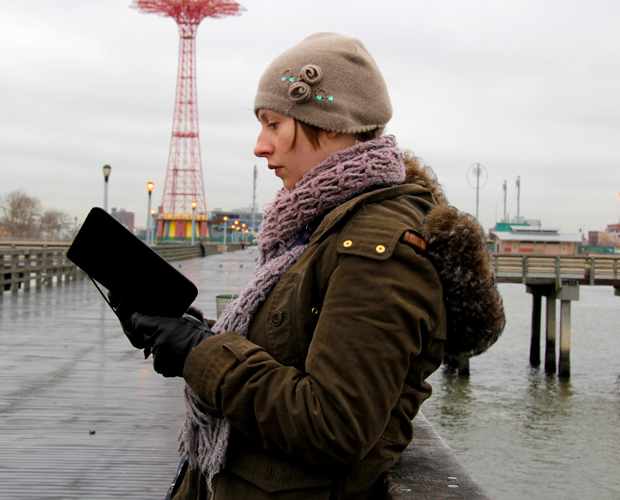
Ann Morgan’s self-imposed challenge to read 196 books in a year taught her much about the world of literary censorship. Credit: Steve Lennon
“For as long as people have been telling stories other people have been trying to shut them up,” writes Ann Morgan in Reading the World: Confessions of a Literary Explorer. The book, published earlier this year, charts her bid to read a book from each of the world’s 196 independent states. In the 365-day challenge, she faced constant barriers, from trying to find literature in places with almost no publishing industry, such as the Marshall Islands, to tracking down the works that the authorities have tried to hide.
Morgan found herself getting a crash course in world censorship. Two of the exiled writers she profiled have stories featured in the summer 2015 edition of Index on Censorship magazine: Ak Welsapar from Turkmenistan and Hamid Ismailov from Uzbekistan.
It was a chance tweet that Morgan spotted about Welsapar’s poetry that first led her to the as-yet-unpublished translation of his novel, The Tale of Aypi. She was soon struck by his use of Aesopian language and allegory to communicate subversive or challenging ideas, a literary tactic that Welsapar revealed was by no means accidental. Morgan told Index, “Towards the end of the Soviet era there was a relative loophole in one of the censor’s guidance documents that said that if there was an element of doubt in what was meant, the writer had the benefit of the doubt. This was a grey area that was quite freeing for Ak.” However, when the country declared independence in 1991, he found himself more censored than ever before, his works were banned and he was forced to flee to Sweden.
Ismailov faced a similar plight. After working on a series of articles and projects that criticised the Uzbek regime, his books – and even any mention of his name – were forbidden. He fled the country and ended up in the UK, working for the BBC. Morgan said: “When [Ismailov] was growing up, he always thought there was something wrong with the literature he was reading. All the positives he’d been bombarded with in Soviet literature didn’t make sense. He was seeing this gap between his reality and the reality of what he was reading.”
But of the 196 countries Morgan explored on a literary level, North Korea was the one that intrigued her the most. Keen to discover what – if anything – is read within its fiercely guarded border, she contacted a spokesman for the Democratic People’s Republic of Korea’s (DPRK) Committee for Cultural Relations for Foreign Countries (run by Alejandro Cao De Benós, the first and only foreigner to be allowed to work for the government in North Korea) and, after much persistence, was eventually sent a manuscript of My Life and Faith, the memoir of jailed North Korean war correspondent Ri In Mo. Mo was imprisoned for 40 years in South Korea in 1950, after being arrested for fighting as a guerrilla during the Korean War. Although his autobiography is primarily used as propaganda, Morgan found his work far less two-dimensional than she had expected; it included thought-provoking passages on how Mo engaged with the South Korean media after his release and how his words were altered by journalists to make him sound “more North Korean”.
Morgan feels her interactions with the DPRK Committee and reading the corresponding work taught her much about our refusal in the west to engage with abhorrent ideas: “I got reactions from people saying you shouldn’t read anything from there [North Korea], but to me this was still censorship, it was quite sinister. How are you to have a dialogue and move forwards if you are banishing them from the realm of the human and not allowing for any common ground?”
So does she believe books such as hers can help bring people’s attention worldwide to the issues surrounding literary censorship and further publicise these semi-forgotten works? “Hopefully, the project has brought attention to the works of a number of those writers who I encountered, and the works of many other writers out there who I didn’t read directly. I hope it encourages readers generally to look further and I hope in the long run it will bring more opportunities for other writers.”
You can read short stories by Ak Welsapar and Hamid Ismailov in the summer 2015 issue of Index on Censorship magazine. Ann Morgan’s book, Reading the World: Confessions of a Literary Explorer, was published in the UK by Harville Sacker in January 2015. Her blog is A year of reading the world.











